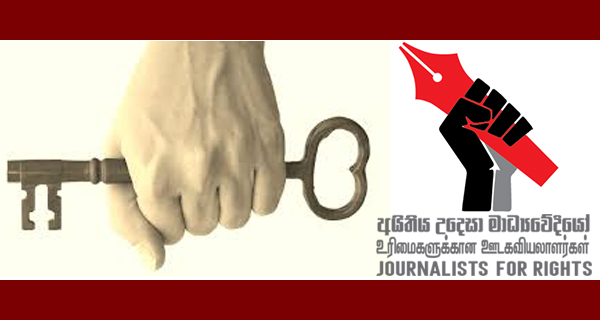The Journalists for Rights says that the protection of fundamental rights, including the right to information, was an inalienable responsibility of the government and the Right to Information is essential for the sustainability of democracy and an independent citizen who enjoys freedoms and rights.
In every year September (28) is the day to ensure universal access to information in accordance with Resolution 38C 57 adopted at the 74th Session of the United Nations General Assembly. The organization said this in a press release issued under the headline “Let us Guarantee the ‘information vaccine’ for all”.
The statement signed by Dulan Dasanayake, Attorney-at-Law, K. Sanjeewa and Jayani Abeysekera on behalf of the Convening Board of the organization.
It further states: Under the resolution 38C 57, in 2019, the 74th UN General Assembly (UNGA) proclaimed 28 September as the International Day for Universal Access to Information.
Although Sri Lanka has achieved fourth place in the Right to Information (RTI) global rating, gaining 131 of 150 marks, the future of Sri Lanka’s Right to Information is in jeopardy now, as some stakeholders perceive. The 20th amendment to the constitution, passed by the current President Gotabaya Rajapaksa, immediately after he came to power, undermined many legal reforms to strengthen democracy and citizens’ rights. However, thankfully, we must mention that the government has defended the people’s Right to Information.
However, we understand that the authenticity of the independent commissions essential for uplifting democracy and citizens’ rights is contested by the 20th amendment. For example, the independence of the Right to Information Act is directly affected because the President has retained the power to appoint the commissioners. The term of the incumbent commissioners of the Right to Information Commission will expire soon, and the President is supposed to appoint a new commission under the powers vested in him by the 20th amendment to the constitution.
Against this backdrop, we urge the President to appoint persons with a history of integrity as the new commissioners of the Right to Information Commission.
We want to point out further that we have failed to create a culture of opening information to people, although Sri Lanka has been internationally recognized in terms of the Right to Information. We believe that state agencies do not need to wait until a request is made to open information to the public. Therefore, we urge the government to create a culture of opening information in the public authorities.
We highlight that the incident of destruction of the National Medicines Regulatory Authority database is a new type of technology-based threat to the citizen’s Right to Information. We stress to the government that safeguarding the people’s Right to Information is a state responsibility. Therefore, the government must conduct an independent investigation regarding data theft and initiate stern action to stop recurrence. We are vigilant about the progress of the investigation and the effort to safeguard public information.
Journalists for Rights emphasize that the Right to Information is part of sovereignty and that the state has the inalienable responsibility of safeguarding fundamental rights, including the Right to Information. Just as people require vaccination to protect from COVID-19 virus, the Right to Information is essential for the sustainability of democracy and an independent citizen who enjoys freedoms and rights.
